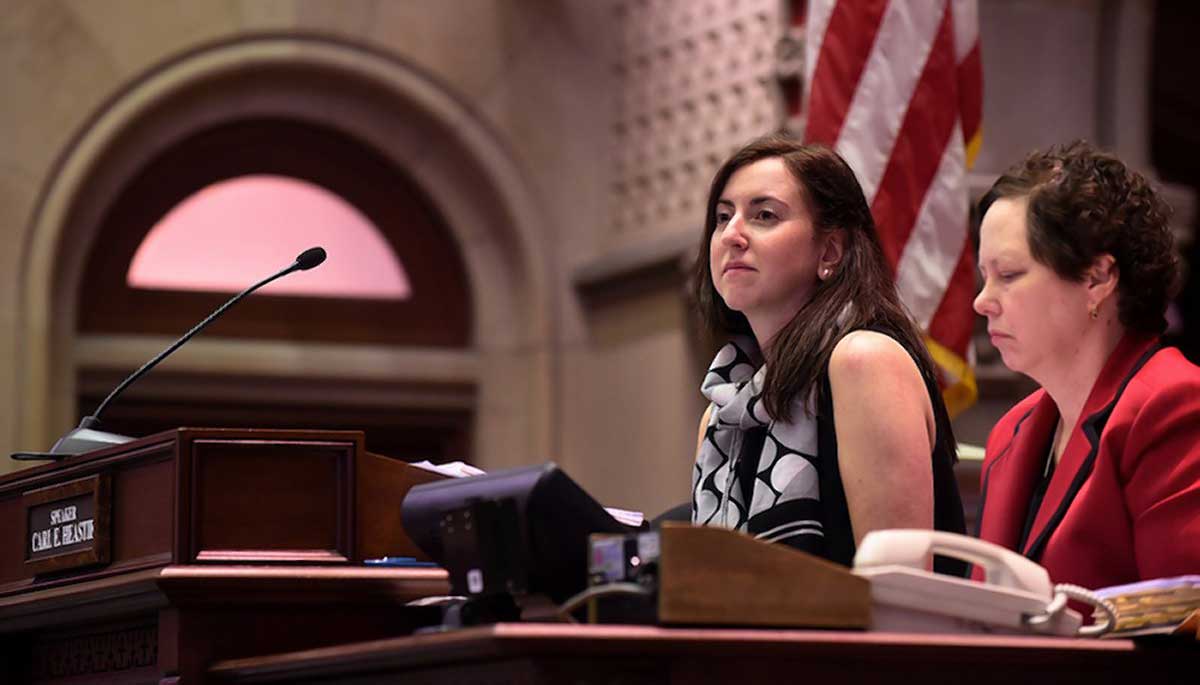As the city marked the solemn occasion of Holocaust Remembrance Day on Thursday, April, 8, Assemblywoman Nily Rozic announced an increase of $1.5 million in funding to the Holocaust Survivors Initiative that was a top priority in this year’s state budget.
Rozic thanked Assembly Speaker Carl Heastie and 10 state legislators for their partnership in securing the essential funding to assist Holocaust survivors. This record allocation marks an almost 400 percent increase in funding from previous year’s budgets.
“New York’s budget commits to caring for those who need it most – Holocaust survivors. It is our responsibility to ensure that they have access to all the necessary services to live with the comfort and dignity they deserve, especially with the added health risks associated with the COVID-19 pandemic,” Rozic said.
The funding approved in this year’s state budget for Holocaust survivors residing in New York will provide financial assistance, mental health care, legal services, transportation, and sensitive end-of-life care. As survivors age and navigate expected challenges, they need additional support for issues that stem directly from experiences in the Holocaust. Studies have found that survivors face a higher incidence of cancer, heart disease, PTSD, and depression. More than 50 percent of survivors living in New York City can be classified as ‘very poor’ or ‘near poor’ under federal guidelines.
“This year’s budget backs up the state’s support of Holocaust survivors with landmark funding to ensure our most vulnerable receive the services and support they need,” Heastie said. “Yom HaShoah is an annual reminder of what can happen when hate is unchecked and I am proud to reiterate that New York rejects hate and stands with survivors.”
Queens Assembly members who joined Rozic in advocating for an increase of funding to the Holocaust Survivors Initiative, expressed their support for the measure.
“In a time where we must all be socially distant due to the COVID-19 pandemic, these services are needed now more than ever to help ensure Holocaust survivors live and age in dignity and respect,” said Assemblyman David Weprin.
As thousands of Holocaust survivors in New York live below or near the federal poverty line, and countless others are still affected by the immeasurable trauma they experienced as children and young adults, Assemblyman Andrew Hevesi said it is “imperative to protect this vitally important group of individuals and offer them every resource at our disposal.”
Assemblyman Daniel Rosenthal highlighted the importance of providing the resources that survivors require in order for them to live with grace and dignity.
“When the last of a generation that survived unspeakable atrocities needs help we have a duty to be there for them,” Rosenthal said. “I proudly stand with my colleagues in this worthwhile effort.”
Meanwhile, nonprofit organizations such as the UJA-Federation of New York and Commonpoint Queens, applauded Rozic and her colleague’s in the Assembly and Senate for their unwavering commitment in securing the funding.
“We are so grateful for Assemblywoman Rozic’s advocacy and efforts to provide these incredibly meaningful resources for our community’s Holocaust survivors and their families,” said Danielle Ellman, CEO of Commonpoint Queens. “It’s an honor to work together to provide vital programs, focusing on everything from physical and mental health to socialization opportunities.”
Eric Goldstein of the UJA-Federation of New York, the largest local Jewish philanthropy in the world, said the lawmakers’ commitment to helping survivors age with dignity has resulted in the significant investment.
“Because of their past trauma, survivors often require a special set of social, health, and mental health services, and this funding will make a huge difference helping these individuals,” Goldstein said.
For Holocaust survivors, the COVID-19 pandemic has meant more than a year of living in insolation, experiencing trauma, and demonstrating resilience, according to Stuart Kaplan, CEO of Selfhelp Community Services, one of the largest and most respected not-for-profit human service agencies in the New York metropolitan area.
As the city enters the final stage of the pandemic, Kaplan said funding and support from the government is key to ensuring that survivors continue to age with independence and dignity they deserve, especially those struggling with poverty and deteriorating health conditions.
Masha Pearl, executive director of The Blue Card, which assists Holocaust survivors financially, expressed gratitude to all of the sponsors involved in allocating support for Holocaust survivors living in poverty.
“These funds are absolutely vital for the health and well-being of this extremely vulnerable population and we are very appreciative that the New York state Legislature remembers them and supports them in these challenging times,” Pearl said.




































